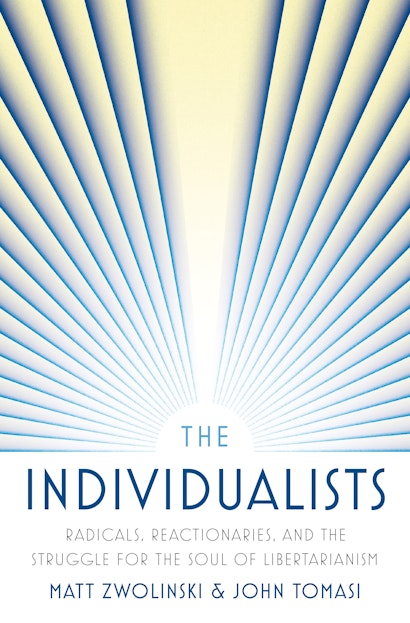Libertarianism emerged in the mid-nineteenth century with an unwavering commitment to progressive causes, from women’s rights and the fight against slavery to anti-colonialism and Irish emancipation. Today, this movement founded on the principle of individual liberty finds itself divided by both progressive and reactionary elements vying to claim it as their own. The Individualists is the untold story of a political doctrine continually reshaped by fierce internal tensions, bold and eccentric personalities, and shifting political circumstances.
Let’s start with the basics. What is libertarianism? Isn’t it basically just a kind of conservatism?
At its core, libertarianism is a radical ideology based on nearly absolute commitment to individual freedom - to private property, free markets, and strictly limited government power. Taking that commitment seriously means being willing to tear down and discard any political and economic institutions that violate individual rights. So, for example, libertarians generally support drastically shrinking the welfare state - or abolishing it altogether. That might sound like a conservative position, but libertarians also favor ending the war on drugs, removing restrictions on immigration, and eliminating subsidies and protective support for big businesses. So there are many ways–both in terms of foundational moral commitments and concrete issues of public policy— in which libertarianism and conservativism are fundamentally at odds.
Nonetheless, over the course of the twentieth century, libertarians and conservatives found themselves fighting on the same side in some major battles. During the 20th century, libertarians and conservatives came together to fight against the New Deal and the growth of state power, and both saw international communism as an existential threat to human freedom. Their unity against a common enemy sometimes led libertarians to ignore or minimize a number of important disagreements with conservatives about the proper role of the state, the value of progress vs. tradition, and the importance individualism vs. community. In our book, we show how this alliance shaped, and arguably distorted, the way libertarians understood their view.
Today, in our post-Soviet and largely post-socialist world, libertarianism is undergoing something of a crisis of identity. Without socialism to define itself against, what is libertarianism for? Some advocate forms of libertarianism that would return it to its roots as a pure doctrine of liberation–regardless of one’s racial background or country of origin, for example. Others are pushing against this idea, and seeking to fix libertarianism as a more conservative doctrine - one that rejects cosmopolitanism and cultural liberalism in favor of adherence to traditional moral norms. Even as this book goes to press, the struggle between these forces is causing turmoil within the ranks of the Libertarian Party and the libertarian movement more generally.
Most people associate libertarianism with late 20th century American thinkers such Ayn Rand, Milton Friedman, and Robert Nozick. Did this group invent the idea of libertarianism?
Many people view libertarianism as a quintessentially American doctrine, born during the Cold War as a reaction to socialism. In fact, libertarianism emerged in the middle of the 19th century in England and France, not the United States.
Libertarianism began in Europe as a radicalized version of what we would now call “classical liberal” political thought. Early liberal thinkers such as Adam Smith and David Hume emphasized the importance of private property, market exchange, and relatively limited government. But the first libertarians took these ideas and pushed them to their logical extremes. For libertarians, individual freedom was not merely one value among others to be weighed and measured in the calculus of social policy. Rather, individual freedom was a moral imperative, one which set firm and inflexible limits on state power. From its birth, libertarianism was a radical and absolutist doctrine of individual freedom.
Around 1850, you see clear examples of this distinctive approach to politics emerging both in Britain (primarily in the works of Herbert Spencer) and in France (in the works of economists such as Gustave de Molinari and Frédéric Bastiat). Libertarianism first appeared where and when it did as a reaction to the rise of socialism as a revolutionary threat in Europe. For libertarians, state socialism represented the logical endpoint of the growth of state power—an ideological antonym against which they defined their new doctrine. Reacting to this threat, libertarians hardened the classical liberal “presumption” of liberty into an iron-clad rule. Not one inch could be ceded to the state, they thought, lest society drift inexorably down the road to serfdom. Libertarian radicalism thus emerged as a reaction against the perceived radical threat to liberty posed by socialism.
What about the United States? Did I read you correctly as saying that many of the early American libertarians were socialists?
Yes! Those readers you mentioned who only know libertarianism through figures like Ayn Rand and Ron Paul are in for a bit of a shock, because the earliest forms of American libertarianism looked very different. Rather than viewing socialism as an existential threat to liberty, some of the first American libertarians actually embraced the label of “socialist” for themselves!
The main reason is that for the Americans, the word “socialism” meant something very different than it meant for European libertarians like Spencer and Bastiat. For the Europeans, the word referred to an active and revolutionary political movement - one that many believed posed a dire and imminent threat to individual freedom. In America, by contrast, socialism was more of a philosophical ideal than a political force. And the kind of socialism that was held as an ideal was often conceived of as voluntary and even anarchistic in nature - a far cry from the kind of state-based socialist despotisms with which we are familiar from the 20th century.
Libertarians in 19th century America thus didn’t see socialism as any kind of political threat. In fact, many of them endorsed what they took to be the main idea of socialism - that workers are entitled to the full value of what they produce with their labor. The most obvious way in in which that entitlement can be violated is slavery, and for that reason many libertarians were actively involved in the abolitionist movement. But libertarians also argued that there were more subtle ways in which workers could be oppressed. When government uses its coercive power to lend artificial support to capitalists and landowners, this represents a transfer from those who produce, to those who don’t . And so, surprisingly, many 19th century American libertarians joined with socialists in condemning capitalism. Not because they didn’t believe in the libertarian ideals of free markets and individualism, but because they believed that capitalism, as it actually existed, was a betrayal of those ideals.
Where is libertarianism as a political force in politics today? Are libertarians more likely to vote republican or democrat?
We’re living in a time where global politics is dominated by populist authoritarianism on the right, and quasi-socialist liberalism on the left. In other words, it’s a time in which both ends of the political spectrum take for granted that the state will wield expansive power over society, and in which the only real debate is about how exactly that power should be used. The libertarian ideal of radically reducing state power simply isn’t on the table.
But in a way, it’s precisely that marginalization that makes libertarian ideas so relevant now. In a time when ideas like individualism and skepticism of state authority seem hopelessly out of fashion, libertarianism reminds us of why they matter, and presents us with a rich tradition of thought that attempts to take those ideas as seriously as possible.
In fact, it has always been at times very much like these that libertarian ideas have flourished - it has always been when the prospects for freedom look the most bleak that new voices have sprung up to revive and revitalize them. For example, in the 1930’s, liberal democracies were threatened by socialist tyranny on the left, and fascist tyranny on the right. And it was in exactly this context that an incredible flourishing of libertarian thought took place. Ayn Rand’s individualist novel, The Fountainhead, was published in 1943, the same year as Rose Wilder Lane’s libertarian history The Discovery of Freedom and Isabel Patterson’s paean to the creative powers of a free society, The God of the Machine. Just one year later, in 1944, the Austrian economist Friedrich Hayek published The Road to Serfdom and his mentor Ludwig von Mises published both Bureaucracy and Omnipotent Government. These books were just the first entries in a new wave of thought that would define libertarian thought for the 20th century.
So, it’s true that libertarian ideas seem out of place today. But that might be exactly why it’s so important now to think about why those ideas seemed to matter in the past, and how they might be revised, refreshed, and renewed to help us meet the challenges of today. We’ve been here before, and we can learn both from the insights and the errors of those who have gone before us.
Matt Zwolinski is professor of philosophy at the University of San Diego, where he is director of the Center for Ethics, Economics, and Public Policy. His books include The Routledge Companion to Libertarianism. John Tomasi is president of Heterodox Academy in New York City. He is the author of Free Market Fairness (Princeton).

